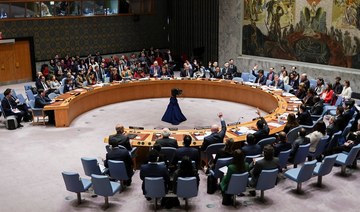RIYADH: The tragic events unfolding in Gaza since Oct. 7 have cast a sorrowful shadow over the upcoming Christmas celebrations. With many Palestinian Christians losing their lives, the joy of this festive occasion seems muted.
In Gaza, a region that has witnessed relentless violence and conflict from the Israeli military, both Muslim and Christian communities have been targets.
According to the UN Relief and Works Agency for Palestine Refugees, 1.9 million people have been displaced since Oct. 7, comprising nearly 85 percent of Gaza’s residents.
While the Israeli aggression transcends religion, destroying both Muslim and Christian places of worship along with those taking shelter within them, the Saudi humanitarian efforts are inclusive of all religions and faiths.
In these trying times, the King Salman Humanitarian Aid and Relief Center has undertaken significant efforts to provide relief aid to the people of Gaza since Oct. 7.
The official spokesman for KSRelief, Dr. Samer Al-Jetaily, told Arab News that Israel still imposes restrictions on aid, controlling the number of trucks that enter through Gaza’s crossings. When the Kerem Shalom crossing is closed, the Egyptian Rafah crossing opens.
“The current humanitarian need due to a severe shortage of all the necessities of life is estimated to be 800 trucks per day to the Gaza Strip,” he said.
The maximum aid entering Gaza through Rafah does not exceed 50 trucks daily. Before Oct. 7, about 400 to 500 trucks entered daily.
Al-Jetaily told Arab News: “Unfortunately, what enters now does not constitute more than 10 to 15 trucks a day, and there is an accumulation of trucks at Al-Arish waiting for any opportunity to enter.”
He said that due to Israeli restrictions on basic human needs, KSrelief now has more than 100 trucks waiting at the Rafah crossing.
On Dec. 19, the UN Office for the Coordination of Humanitarian Affairs reported that Israel’s restricting of telecommunications services in southern Gaza resulted in trucks being stuck at the border.
Al-Jetaily said that KSrelief brought in about 104 trucks since Nov. 9.
The first Saudi relief plane to help Palestinians in Gaza left on Nov. 9 from King Khalid International Airport in Riyadh to Al-Arish International Airport in Egypt.
The total aid provided through the relief air and sea bridge is 4,328 tons, including 33 relief planes, 20 ambulances, and four other vessels.
Saudi Arabia raised $158 million from over 1.22 million donors through the Saudi fundraising campaign on the Sahem platform.
“The Kingdom’s contributions come from King Salman bin Abdulaziz and his Crown Prince Mohammed bin Salman’s directive, all members of society, public and private institutions, major companies, and advertisements,” Al-Jetaily said.
The total amount provided for the aid of Palestine exceeded $5 billion during the last 23 years, Al-Jetaily added.
“We are a center that deals with many international organizations, the most important of which are the Palestinian Red Crescent Society and UNRWA, where we receive aid and distribute it to these partners.”
Al-Jetaily said that the international community must devise a decisive plan that guarantees the flow of aid into the Gaza Strip without restriction and without preventing all sorts of aid.
“What Israel is doing is a crime against humanity, a clear violation of international law, which stipulates that they must protect civilians,” he said.
Further, 80 percent of housing in Gaza has been completely destroyed by the Israeli military.
Even those who escape this systematic targeting do not find or receive the minimum level of health care.
“Many deaths now occur due to the unavailability and shortage of medical services, even at the hospital level. Now, 14 out of 36 hospitals are partially working, and a hospital is shot down or attacked.”
With the continuous aerial and ground attacks by the Israeli military, the death toll in Gaza has reached 20,000, more than half of whom are women and children. More than 50,000 people are injured with at least 8,000 missing.
Despite having no Hamas presence in the West Bank, Israel has killed approximately 297 people there, too, including 69 children.
Al-Jetaily told Arab News: “More than 360 doctors and nurses were killed, hospitals were demolished over the heads of patients, and we see the suffering of premature babies and the cutting off of electricity and food, as they are exposed, as we have seen more than once, to slow death.”
UNRWA says that more than 100 of its workers have been killed since Oct. 7, which is the largest crime it has witnessed in decades.
Al-Jetaily said: “We witnessed at Kamal Adwan Hospital in Gaza the Israeli Army entering with bulldozers and trampling on the living people inside the tents. We saw the remains of children and women left behind after the bulldozers left. Is there anything more severe than these crimes?”
On Dec. 19, UNOCHA reported that telecommunications services in southern Gaza were partially restored following the longest shutdown since the onset of the crisis.
These recurrent interruptions and the lack of electricity hinder access to vital information and severely affect humanitarian relief efforts.
The besieged enclave already faces severe shortages of essential supplies, such as food, water, gas, and medical assistance.
KSrelief received news that the Kerem Shalom crossing has opened, which means there is the possibility of bringing in aid with a larger capacity if Israel allows.
The Rafah refugee camp has been plagued by violence, poverty, and despair for years. Currently, however, the suffering of the residents has reached an unprecedented level.
Al-Jetaily said that the first and most important step to preserve innocent Palestinian lives is through a ceasefire. Saudi Arabia voted for a ceasefire at the UN Security Council on Dec. 8.

































